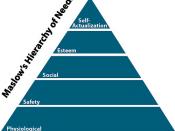Many countless religions exist in the world today. Among these are Christianity, Buddhism, Jainism and Shinto to name a few. While many differences exist among the religions, many similarities also exist. One such characteristic common to many religions is motivation. Motivation is used to encourage followers to act in a manner consistent with the religion's teachings and to avoid activity that is considered inappropriate. This motivation comes in various forms which can be generally grouped into two categories negative and positive. While these two categories exist in both Western and Eastern religions, both take decidedly different approaches to motivation.
Negative Motivations from a Western Religious PerspectiveSin from a religious perspectiveSin from a Western religious perspective is viewed as the breaking of God's law or of God's will. The Bible, John 3:4 states: "Whosoever committeth sin transgresseth also the law: for sin is the transgression of the law." (1 John 3:4) Sin is perceived as a violation, breaking a contract; salvation is viewed in legal terms.
Sin is an act that violates a moral rule that have been set by God. Sin is portrayed as an action that is forbidden or considered wrong. Sin does not fall under the law of government it falls under God's law. From the Bible in the book of Genesis, it speaks of how Adam committed a sin by giving in to his temptation and eating the forbidden fruit. Adam did not follow God's law knowing that eating the fruit was forbidden, Adam could not resist the temptation, and he gave in to his weakness breaking God's law.
Dealing with guiltThe word guilt in the dictionary is defined as "feeling of responsibility or remorse for some offense, crime, wrong, etc, whether real or imagined" (Encyclopedia, 2006, para 1). Guilt is an internal control system that...


